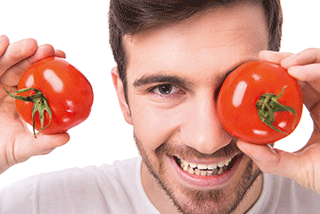Natural health for him

We take a look at some important nutrients to support men’s health
According to the Men’s Health Forum, men are less likely to lead a healthy lifestyle than women because they are more likely to smoke, drink alcohol to hazardous levels and be overweight or obese. Unfortunately these lifestyle choices can lead to diseases ranging from cancer to heart disease and strokes. The aim of Men’s Health Week, which runs from 15 to 21 June and is organised by the Men’s Health Forum (www.menshealthforum.org.uk), is to encourage more men to adopt a healthier lifestyle by not smoking, drinking sensibly, being active and watching their weight. With this in mind, let’s take a look at some vitamins and minerals that will benefit the health of men in particular.
Lycopene
“Tomatoes contain a key chemical called lycopene, which stops prostate cancer cells from multiplying,” explains Marc Laniado, who runs Windsor Urology (www.windsorurology.co.uk). “Last year lycopene was proven to reduce the risk of prostate cancer by up to a fifth in a study carried out on 1,806 men aged 50-69 by Bristol, Cambridge and Oxford universities.” Marc adds that eating a diet that’s full of fresh fruit, vegetables and soya products can also help the body fight the disease, especially if you avoid eating too many processed foods and red meat. Cruciferous vegetables like broccoli are especially beneficial.
L-arginine
L-arginine is an essential amino acid that has been found to help with erectile dysfunction. It promotes the formation of nitric oxide, which helps to dilate the blood vessels. “Supplementation with L-arginine has been shown to restore erectile quality and increase sexual satisfaction by boosting nitric oxide bioactivity and improving blood flow to the penis,” explains nutritionist Christine Bailey (www.christinebailey.co.uk). Other supplements which have the same effect include ginseng and ginkgo biloba.
“There are both biological and psychological reasons for erectile dysfunction,” adds Christine. “Biological causes include hormonal, vascular and neurologic disorders. Certain lifestyle modifications may help this condition. For example, studies have shown that exercise can improve erectile function, sexual response and overall cardiovascular health. Obesity nearly doubles the risk of erectile dysfunction, so losing weight and switching to a Mediterranean style of eating could help too.”

Isoflavones
Research has shown that isoflavones can help to slow down the growth of prostate cancer by inhibiting the proliferation of cancer cells and preventing them from dividing.
Marc Laniado recommends eating pulses such as kidney beans, chickpeas, lentils and soya beans as these all contain isoflavones. “Soya beans have particularly high levels of these protective isoflavones,” he says. “Also try soya milk, tofu, soya yoghurts, soya bread and miso soup. And make sure you drink plenty of fluids and get plenty of sunshine because vitamin D can also help reduce the risk of prostate cancer.”
Magnesium
“Magnesium is needed for maintaining heart health, muscle health, good sleep and controlling levels of stress,” explains nutritionist Brianna O Malley (www.facebook.com/wealthinhealthnutrition). “It’s therefore an important mineral for maintaining a healthy body. It is extremely beneficial for men’s health because of its control over blood pressure, insomnia, anxiety and tiredness. The recommended daily allowance of magnesium in the diet is 400mg per day. The best sources of magnesium are almonds (124mg per half cup), spinach (269mg for one bunch), buckwheat, quinoa, dark chocolate and rolled oats.” Brianna suggests that if you decide to supplement with magnesium be sure to combine it with a vitamin C supplement to aid absorption.
Zinc
“Zinc is directly involved in cell division and is a powerful antioxidant,” says Brianna O Malley, “and so plays an important role in protection against cancer. It is particularly important to men’s health because deficiencies of the mineral can lead to infertility, exacerbated stress, tiredness, irritability and bad memory. Zinc is also important for cognitive function, physical performance and slowing the process of ageing. The recommended daily allowance of zinc per day is about 11mg. Excellent sources of zinc include nuts and cereals fortified with zinc. However the best sources include oysters, which contain 74mg per 90g and beef which contains 7mg per 90g.” Brianna recommends that vegetarians consider supplementation to increase their levels of zinc because the zinc found in plant-based foods is bound to phytates in the plants, which prevents it from being absorbed by the body.
Protein
“Protein has been shown, through thousands of scientific studies and through independent research, to contribute to both the growth and maintenance of muscle mass,” explains PhD Nutrition ambassador Chris Spearman. We all need protein in our diets, but men who are particularly sporty or who regularly practise weight training will need to up their intake. Around 1g of protein per 1kg of body weight is recommended for sporty individuals. Protein is particularly important after exercise as it helps the muscles to recover and grow. Around 15 to 25g of protein is recommended within 30 minutes of exercising. “Whey protein powder is considered the most widely used supplement and is most commonly associated with strength, speed and power athletes,” says Chris. Other good sources of protein include eggs, milk, yoghurt, fish, seafood, soya, chicken and turkey.
Vitamin D
This vital vitamin plays many important roles in men’s health from supporting immunity and sexual function to helping skeletal and cardiovascular health. However, a Copenhagen University Hospital study found evidence to suggest that it can play a particularly vital role in our mortality. The researchers discovered that individuals with low levels of vitamin D had an increased mortality rate of 30 per cent and a 40 per cent higher risk of cancer-related death. Our bodies synthesise vitamin D through exposure to the sun, which is why it is commonly referred to as the sunshine vitamin. Good food sources include oily fish such as salmon, sardines and mackerel; eggs, fortified fat spreads and fortified breakfast cereals.
Vitamin C
Vitamin C is a vital nutrient for men who want to enhance their fertility as it helps to guard against cellular damage from a particular type of free radical known as reactive oxygen species (ROS). ROS occur naturally in the body and form an important part of our immune systems, but they are also produced through smoking, drinking alcohol, industrial compounds or even exercise. A build-up of ROS can lead to cell damage and researchers at the Urological Institute at the Cleveland Clinic Foundation in the US found that men with unexplained fertility problems had high levels of ROS in their sperm. Foods with particularly high levels of vitamin C include yellow peppers, papayas, kale and strawberries.
Read previous Your Health articles here...